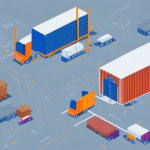3PL vs 4PL: What's the Difference?
Introduction to 3PL and 4PL
In the dynamic world of logistics and supply chain management, understanding the roles of third-party logistics (3PL) and fourth-party logistics (4PL) providers is crucial for optimizing operations. Both 3PL and 4PL companies offer valuable services that help businesses streamline their supply chains, but they differ significantly in terms of scope, responsibility, and strategic involvement.
Understanding 3PL: Third-Party Logistics Explained
What is a 3PL?
A Third-Party Logistics (3PL) provider offers outsourced logistics services, which encompass a range of activities such as transportation, warehousing, and freight forwarding. 3PL companies act as an external resource, managing specific logistics functions to enhance efficiency and reduce costs.
Services Offered by 3PL Providers
- Transportation Management: Handling the movement of goods via various modes of transport.
- Warehousing and Storage: Providing storage solutions and managing inventory.
- Freight Forwarding: Coordinating the shipment of goods across international borders.
- Order Fulfillment: Managing the processing and delivery of customer orders.
Benefits of Using a 3PL
- Cost Efficiency: Reducing expenses related to logistics infrastructure and labor.
- Scalability: Easily scaling logistics operations up or down based on business needs.
- Expertise: Leveraging specialized knowledge and experience in logistics management.
According to a Statista report, the global 3PL market size was valued at over $1 trillion in 2023, highlighting its significant impact on global supply chains.
Understanding 4PL: Fourth-Party Logistics Explained
What is a 4PL?
A Fourth-Party Logistics (4PL) provider goes beyond the traditional services offered by 3PLs by acting as a single point of contact for managing the entire supply chain. 4PL companies integrate and oversee multiple 3PLs and other service providers to create a cohesive and optimized supply chain strategy.
Services Offered by 4PL Providers
- Supply Chain Integration: Coordinating various logistics activities and providers into a unified strategy.
- Strategic Planning: Developing long-term supply chain strategies to enhance efficiency and competitiveness.
- Consulting Services: Providing expert advice on supply chain optimization and innovation.
- Technology Management: Implementing advanced supply chain technologies and systems.
Benefits of Using a 4PL
- End-to-End Visibility: Gaining comprehensive insights into the entire supply chain.
- Enhanced Efficiency: Streamlining processes and reducing redundancies across the supply chain.
- Strategic Advantage: Leveraging advanced strategies to stay ahead in the competitive market.
Research by Gartner indicates that businesses utilizing 4PL services experience a 15-20% improvement in supply chain efficiency compared to those relying solely on 3PL providers.
Key Differences Between 3PL and 4PL
Scope of Services
While 3PL providers focus on executing specific logistics functions, 4PL providers take a holistic approach, managing and integrating multiple aspects of the supply chain to ensure seamless operations.
Level of Control
3PL companies operate on behalf of the business, handling day-to-day logistics tasks while the business retains strategic control. In contrast, 4PL companies assume full responsibility for the supply chain, including strategic planning and execution.
Strategic Involvement
4PL providers are deeply involved in the strategic aspects of supply chain management, offering insights and recommendations for continuous improvement. 3PL providers, however, typically focus on the tactical execution of logistics tasks.
Benefits of 3PL and 4PL for Your Business
Cost Savings
Outsourcing logistics to 3PL or 4PL providers can lead to significant cost savings by eliminating the need for investing in logistics infrastructure and reducing operational expenses.
Access to Expertise
Both 3PL and 4PL providers bring specialized knowledge and expertise, enabling businesses to leverage best practices and advanced technologies without the need for in-house expertise.
Scalability and Flexibility
Outsourcing logistics allows businesses to scale their operations efficiently, adapting to market demands without the constraints of fixed logistics capacities.
Improved Focus on Core Business
By delegating logistics management to external providers, businesses can concentrate on their core competencies, driving growth and innovation.
How to Choose Between 3PL and 4PL Services
Assess Your Business Needs
Determine whether your business requires specific logistics functions or a comprehensive supply chain management solution. 3PLs are ideal for handling particular logistics tasks, while 4PLs are suitable for managing the entire supply chain.
Evaluate Provider Expertise
Consider the expertise and capabilities of potential providers. Ensure that the provider has a proven track record in your industry and can meet your specific logistics requirements.
Consider Strategic Goals
Align your choice with your long-term business objectives. If strategic supply chain optimization is a priority, a 4PL provider may offer the necessary support and expertise.
Review Technological Capabilities
Ensure that the provider utilizes advanced technologies and offers robust integration capabilities to enhance supply chain visibility and efficiency.
Conclusion
Choosing between a 3PL and a 4PL provider depends on your business's specific needs and strategic goals. While 3PLs offer specialized logistics services that can enhance operational efficiency, 4PLs provide comprehensive supply chain management solutions that drive strategic growth. Understanding the key differences and evaluating your business requirements will help you make an informed decision to optimize your supply chain effectively.






















